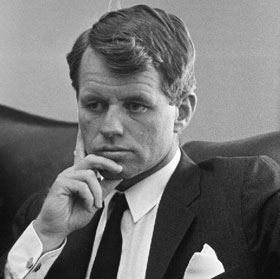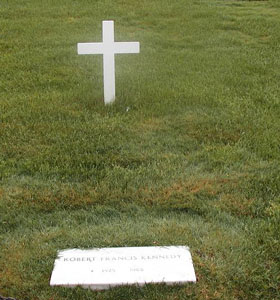June 8, 1968: Robert Kennedy Buried
 Three days after falling prey to an assassin in California, Senator Robert F. Kennedy is laid to rest at Arlington National Cemetery in Virginia, just 30 yards from the grave of his assassinated older brother, President John F. Kennedy.
Three days after falling prey to an assassin in California, Senator Robert F. Kennedy is laid to rest at Arlington National Cemetery in Virginia, just 30 yards from the grave of his assassinated older brother, President John F. Kennedy.
Robert Kennedy, born in Brookline, Massachusetts, in 1925, interrupted his studies at Harvard University to serve in the U.S. Navy during World War II. He was legal counsel for various Senate subcommittees during the 1950s and in 1960 served as the manager of his brother's successful presidential campaign. Appointed attorney general by President Kennedy, he proved a vigorous member of the cabinet, zealously prosecuting cases relating to civil rights while closely advising the president on domestic and foreign issues. After John F. Kennedy's assassination in 1963, Robert joined President Lyndon B. Johnson's administration but resigned in 1964 to run successfully in New York for a Senate seat. He became a leader of liberal Democrats in Congress and voiced criticism of the war in Vietnam.
In 1968, he was urged by many of his supporters to run for president as an anti-war and socially progressive Democratic. Hesitant until he saw positive primary returns for fellow anti-war candidate Eugene McCarthy, he announced his candidacy for the Democratic presidential nomination on March 16, 1968. Fifteen days later, President Johnson announced that he would not seek reelection, and Vice President Hubert Humphrey became the key Democratic hopeful, with McCarthy and Kennedy trailing closely behind. Kennedy conducted an energetic campaign and on June 4, 1968, won a major victory in the California primary. He had won five out of six primaries and seemed a shoo-in for the Democratic nomination and, some thought, the presidency.
Shortly after midnight, Kennedy gave a victory speech to his supporters in the Ambassador Hotel in Los Angeles. At 12:50 a.m., while making his way to a press conference by a side exit, he was shot three times in a hail of gunfire that wounded five others. One bullet entered Kennedy's brain. The shooter, a Palestinian drifter named Sirhan Sirhan, had a .22 revolver wrested from his grip and was promptly arrested. Kennedy was rushed to the hospital, where he fought for his life for the next 24 hours. At 1:44 a.m. on the morning of June 6, he died. He was 42 years old.
 |
|
Robert F. Kennedy Cross
|
His assassination came only two months after civil rights leader Martin Luther King, Jr., was shot and killed in Memphis, Tennessee. Like King, Robert Kennedy had advocated social reform, defended the rights of minorities, and called for an end to the Vietnam War. The loss was devastating to many Americans and was made only more tragic by memories of his older brother's assassination five years earlier.
On the evening of June 6, Kennedy's body was brought to St. Patrick's Cathedral in New York City, and the next day a line of mourners 25 blocks long waited to pass by his coffin. On Saturday morning, June 8, thousands attended a funeral Mass at St. Patrick's. The diverse collection of mourners listened to Leonard Bernstein conduct a Mahler symphony and Andy Williams sing Kennedy's favorite anthem, "The Battle Hymn of the Republic." Edward M. Kennedy, Robert's younger brother and a U.S. senator from Massachusetts, delivered a eulogy:
"My brother need not be idolized or enlarged in death beyond what he was in life. [He should] be remembered simply as a good and decent man, who saw wrong and tried to right it, saw suffering and tried to heal it, saw war and tried to stop it. Those of us who loved him, and who take him to his rest today, pray that what he was to us, and what he wished for others, will someday come to pass for all the world. As he said many times, in many parts of this nation, to those he touched and who sought to touch him: "Some men see things as they are and say, 'Why?' I dream of things that never were and say, 'Why not?'"
On Saturday afternoon, Kennedy's coffin was taken by funeral train from New York to Washington. Hundreds of thousands of mourners, perhaps more than a million, lined the tracks. In New Jersey, two bystanders who jumped the tracks were killed by a train passing in the other direction. The funeral train arrived at Washington's Union Station shortly after 9 p.m. A motorcade then took Robert F. Kennedy's body to Arlington National Cemetery for the only night-time burial in the cemetery's history.